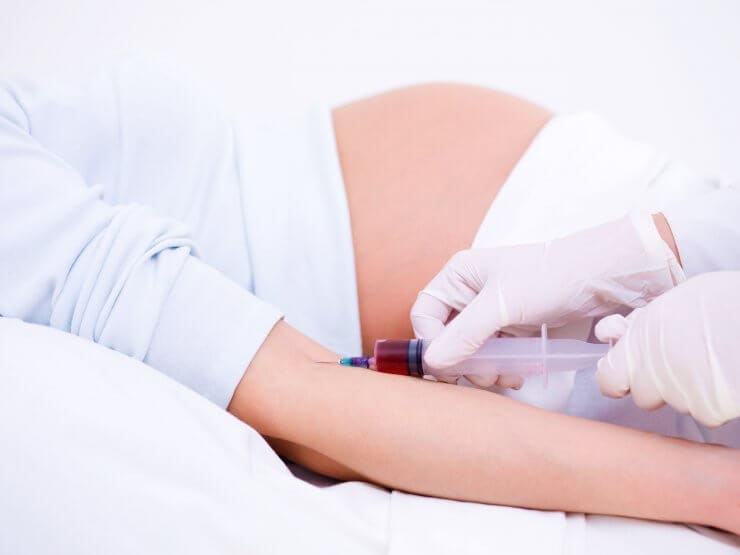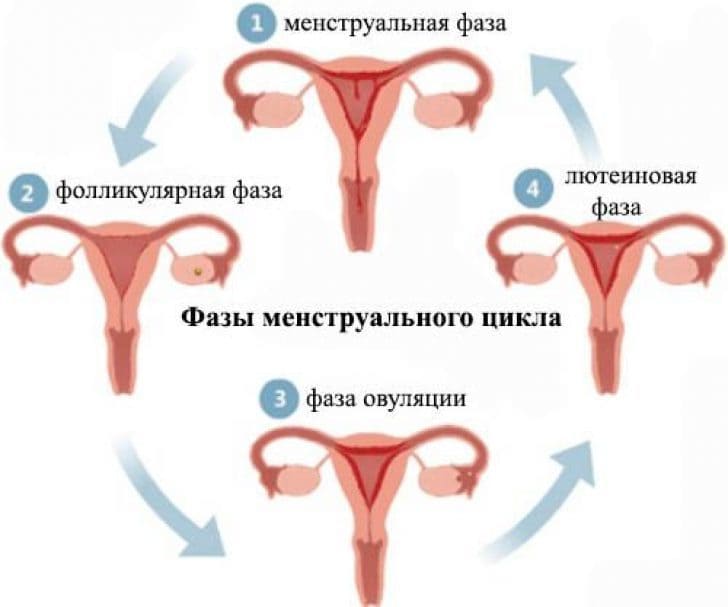Planning a second pregnancy: how to choose the right time
Usually the difficulties of pregnancy and childbirth are forgotten very quickly, and only funny stories from the maternity hospital and the smile of your beloved baby remain.
When parents get used to their new status, they think about repeating their feat and plan for a second child.
It is difficult to name the exact ideal time for a second pregnancy, because it depends on many factors . The age of the expectant mother, the presence or absence of chronic diseases, the course of the first pregnancy and childbirth play a role.
One thing is certain: each pregnancy will be different from the previous one, because all babies have different characters, and the mother’s body can react to them differently.
Scientists have come to the conclusion that it is necessary to give birth to a second child no earlier than two years after the first . Otherwise, no matter how the first-born is raised, and no matter how much he is taught, he will not be distinguished by his extraordinary intelligence. The more parents engage with a child under two years of age, the better he will perform when he goes to school. And with the birth of the second baby, the firstborn will be given quite a bit of time, which will not benefit his development.
The best time for a second pregnancy will be determined by the body of the expectant mother . Carrying a child is a very serious test for any woman, so you need to make sure you are psychologically prepared to repeat this period.
The female psyche must completely adapt to the new way of life, to the new status of mother. All the difficulties of the postpartum period should also be left behind. But psychological readiness does not mean the readiness of the entire organism as a whole.
In order to bear a healthy baby, a woman’s reproductive system must fully recover after a previous birth. Be prepared for the fact that this will take a lot of time.
Doctors say that you should not torment your body again until 2 years have passed after the first birth . Doctors recommend increasing the interval to three or more years if the mother’s first pregnancy was difficult.
It is important that the uterine suture has time to grow together and heal . This is necessary so that during the “interesting position” the uterus can stretch without the threat of suture rupture and termination of pregnancy.
Mom Veronica from our forum shares her story: “When my husband and I decided to have a second child, we decided to follow the same path as the first time. First, we went to the doctor, passed all the tests, underwent examinations, the doctor assessed the degree of healing of the uterine suture - and only then gave the go-ahead to start a new life. I’m very glad that we didn’t rush with the second one, because I can’t imagine how I would cope with two babies. Our children are 4 years apart, so the eldest is my main assistant around the house and in caring for the little one.”
There is no need to rush into having a second child if the first one had congenital malformations . For now, pay increased attention to your health, undergo all the necessary genetic tests, take a course of vitamins, strengthen your immunity, and pay as much attention to your health as possible. You need to try to minimize the risk of having a baby with pathologies.
If you are breastfeeding your firstborn, at least another six months should pass after the end of lactation. It will be quite problematic to combine breastfeeding and a new pregnancy. Although. everything is possible if you really want it.
When to start planning
If your first pregnancy was relatively normal and there were no complications during childbirth, you can think about having a second baby in a couple of years. But, at the same time, it is necessary to take into account the speed of recovery of the body, as well as the peculiarities of the rehabilitation period.
After 2-3 years, the body’s reserves will be completely restored, the hormonal levels will be in order, and the uterus will be ready to bear the baby.
But this is only if your first pregnancy went well and the birth was not complicated by a caesarean section. Otherwise, it is better to wait at least five years.
After childbirth, consult your gynecologist regarding the method of contraception. It is extremely undesirable for pregnancy to occur in the first year after the birth of the first child. This can lead to premature birth, as well as various complications during pregnancy, because the body has not had time to recover.
However, you should not delay this, because pregnancy and childbirth after 30 years, when the body has already accumulated fatigue and chronic diseases have appeared, can occur with complications.
In addition, if the difference between children is more than 8 years, your body will perceive your pregnancy as the first, which is associated with the fading of the “dominant pregnancy”, which is responsible for the formation of the birth process.
- About six months before the expected conception, get rid of all bad habits. This applies to both partners. Start leading a healthy lifestyle together, go to the gym, and also walk outdoors more often. Gymnastics, yoga, swimming or cycling are best.
- Take all the tests together and undergo a thorough medical examination. And for the expectant mother, additional consultation with a gynecologist-endocrinologist is needed. If you are overweight, you need to get rid of it.
- Your diet should be balanced and of high quality. Get rid of the habit of eating fatty, salty and spicy foods, reduce the consumption of strong drinks - tea, coffee and forget about fast food.
- Remember that you need to help your body as much as possible to accept the new pregnancy and carry it through safely. If you had a caesarean section, you will need to undergo a number of additional examinations. In this case, examination of the uterine scar will be mandatory. It is advisable that your pregnancy is managed by the same gynecologist as the first time.
- If you are Rh negative and your firstborn is positive, you will need a procedure before pregnancy that can clear the blood of accumulated antibodies.
- When planning a pregnancy, it is very important not to forget about your first child and carefully prepare him in order to avoid unnecessary conflicts and misunderstandings.
During your second pregnancy, the mindset for successful development is very important and you absolutely do not need to hide your anxiety and fear. If necessary, you can make an appointment with a psychologist. This will promote a positive attitude, relieve anxiety and help properly prepare the family for the arrival of a child, as well as an older baby for the arrival of a brother or sister.
This is an important point and contributes to its favorable course and the birth of a healthy baby.
information
Preparing for a second pregnancy is not fundamentally different from planning the first, however, in some cases everything may have its own characteristics: for example, if the previous birth has ended or at.
When is the best time to have a second child?
Pregnancy is the ideal time for the blossoming of the feminine principle in any woman. A pregnant woman is always beautiful. Personally, I am against abortion, but for family planning. It allows you to foresee a lot and avoid unpleasant moments during pregnancy and the first time after his birth.
Planning allows you to carefully prepare for the addition to your family. If there is already one child, most spouses sooner or later have a question about when to go for the second. Society demands one thing, one’s own inner voice suggests the second, and doctors’ opinions express the third. How to navigate a woman? First of all, the psychological and physiological factors of the spouses’ readiness for the birth of another baby are important. Let's weigh everything together.
First and second - is there a difference?
Planning for the second time should be approached just as thoroughly as when planning your first pregnancy. Now a woman already knows how to get pregnant, what changes occur in her body. But keep in mind that the second pregnancy is different from the first.
- Usually it is easier (although, of course, there are exceptions). The body “remembers” the process of pregnancy and childbirth and adapts to changes more easily.
- Varicose veins (if you have this problem) will get worse.
- You will feel fetal movements about a month earlier.
- The fetus is located slightly lower than with the first child. This relieves heartburn, but sometimes leads to increased urination.
- You will most likely need a bandage, even if you didn't wear one during your first pregnancy.
- Childbirth goes faster. But the pain usually doesn't get better.
Medical factors
A woman’s reproductive function, as is known, is restored immediately after breastfeeding ends, and sometimes even before that (hence a considerable number of unplanned pregnancies!). Experts from the World Health Organization estimate that a woman needs at least 30 months to fully recover after a normal birth. During this time, the muscle tissue of the walls of the uterus and hormonal levels are restored. Pregnancy that occurs 12 months after birth, according to doctors, is too early, since the woman’s body is still fairly exhausted.
Pregnancy that occurs at this time may be problematic, and the consequences for the baby’s health may be negative. If the uterine tissues have not fully recovered, miscarriage is possible, and the risk of early miscarriages increases. Uteroplacental blood flow can be seriously affected, which means the risk of fetal hypoxia increases significantly. During pregnancy, which occurs before the woman’s body has recovered, there may be problems with the placement of the placenta. There is a high risk of having a low birth weight fetus and pregnancy anemia.
If the first child was born by caesarean section, then doctors recommend a three-year break. Pregnancy that occurs earlier than this period can lead to rupture of the uterus along the scar, and this is a direct threat to the woman’s life and an almost one hundred percent probability of fetal death due to the divergence of the uterus along the scar and internal bleeding.
When planning a second pregnancy, it is advisable to undergo a medical examination to determine the consistency of the scar. There should be no niches or refinements in it. Parameters are determined by ultrasound. The thickness of the scar in itself does not mean anything. As doctors assure, scars, both thick and thin, tear equally quickly.
I carried my youngest son with a uterine scar only 6 mm thick. Initially, not a single doctor believed in the success of this event in the early stages. For all 9 months, I was supported by the understanding of the main thing - the scar was wealthy. It is also difficult to judge the number of caesarean sections. Official medicine assures that it is safe to carry and surgically give birth to two babies.
How long after the first can I give birth to a second child?
If a woman’s first birth went smoothly, without complications, then very soon she may again think about having a baby. More often it depends not only on the state of health, but also on the level of material security, living conditions, and the psychological situation in the family. You should not plan the next birth if the first child was born prematurely, with developmental disabilities, and the pregnancy process itself was very difficult. No one can guarantee that the second birth will go smoothly, without threatening the woman’s health or life.
How long the recovery period will last depends on the duration of breastfeeding of the first child. If a woman breastfeeds her child for up to 2 years, then she needs to restore her normal menstrual cycle. Sometimes you may need the help of a doctor and take hormonal medications. Before planning a second pregnancy, a woman must undergo a full examination and achieve remission of chronic diseases.
The birth of a second baby in less than 2 years is fraught with premature birth, insufficient blood supply to the placenta, and anemia. Such a pregnancy often leads to fetal malnutrition, prematurity, and even ends in miscarriage. Too long a gap between births (10 years or more), especially if the first child was born at the age of 25–30 years, is no less dangerous.
It's no secret that after 30 years, a woman's body begins to age. Carrying a child at this age can result not only in premature birth or miscarriage, but also in the appearance of a child with genetic abnormalities. There is an opinion among experts that the optimal time for the birth of a second baby is when the first-born turns 5 years old.
Risks of a second pregnancy
It cannot be said that the second pregnancy has a greater risk of complications than the first.
information
If the woman’s health is normal, the previous pregnancy and childbirth were successful, the second pregnancy will also proceed favorably.
There are certain nuances if there is a history. In this case, the woman should carefully listen to the doctor’s recommendations and carefully follow them. At this stage, you should undergo examinations in advance to determine the condition of the uterine scar. If it fails, the risk of complications increases significantly (see topic “”).
It is also possible that problems may arise if the father is Rh positive. In this case, antibodies may appear already during the first pregnancy, the number of which can increase significantly with repeated conceptions. With this problem, the expectant mother needs to be examined at the planning stage and undergo repeated examinations after its onset.
Determining factors
Once a woman has fully recovered from her previous birth, she can begin planning for the birth of a second child. What circumstances influence decision making? Not only physical and moral readiness is important, but also the age of the expectant mother and her material wealth. A woman must decide when to give birth to a second child based on all available conditions and factors.
Mom's age
The best time to give birth to your first child is considered to be between 20 and 26 years old. Although recently more and more women prefer to become mothers for the first time at the age of 30, and there is an explanation for this. The woman has already achieved a lot, built a career and is better aware of the responsibility of motherhood. She approaches the birth of a child with all seriousness. However, after 30–35 years, the body begins to age and fertility begins.
If you can still give birth to your first child at 35 years old, then there will be no time to think about the second. You will have to wait up to 38–40 years for final recovery after the first birth. It is safer to have a second child before age 35. At the same time, the chances of a successful pregnancy and an easy birth increase. After 40 years, of course, they also have a child, but this is difficult for the mother and is fraught with complications for the baby. However, a lot depends on the mother’s health condition.
Health status after natural birth or cesarean section
In the case of a calm pregnancy, a quick and easy natural birth, a woman can give birth within a year. Children of the same age are not at all uncommon, and such births have no special contraindications. A completely different situation arises after a caesarean section, because a woman can give birth only after the scar on the uterus has completely healed. The minimum recovery period after such an operation should be more than 3 years.
Physical, psychological and other capabilities
It is necessary to thoroughly prepare for pregnancy 3–6 months before conception. A woman must undergo a full examination and begin treatment for all existing diseases, including chronic ones. It is worth adhering to the principles of proper nutrition, giving up bad habits, maintaining a work and rest schedule, and engaging in physical exercise.
The main factors when planning a second birth:
- woman's psychological mood;
- physical state;
- moral and psychological situation in the family;
- material capabilities;
- living conditions.
When preparing for a second pregnancy, a woman needs to take into account the course of the previous one, the process of childbirth, the woman’s health status, and the presence of severe chronic diseases. Depending on this, the optimal timing of a possible break is determined.
Many women think that it is impossible to get pregnant while breastfeeding. Indeed, the hormone prolactin, which is responsible for the production of breast milk, prevents the normalization of the menstrual cycle, but exceptions are possible here. When complementary feeding or supplementary feeding is introduced, the baby takes the breast less often, which means that after 2-3 months a woman is quite capable of becoming pregnant again, even without stopping breastfeeding. During this period, you should not forget about contraception, because this is how babies of the same age are born.
Where to start preparing
Preparing for pregnancy is the first responsibility of a mother. After the birth of her first child, the expectant mother already knows what changes will happen in the body, what is most important and what to pay attention to.
Even if pregnancy occurs without complications, it causes changes in all body systems. Only competent pregnancy planning will help you insure against surprises.
Analyzes

When planning a second child, a woman needs to be examined by a doctor. He orders tests. Their list is practically no different from the tests during the first pregnancy.
- General blood analysis.
- Smear.
- Scraping examination.
- Analysis of urine.
- Hormone analysis.
- Ultrasound of the breast, pelvic organs, thyroid gland.
Planning a second pregnancy
After a complete examination by a doctor, you need to move on to the next stage of planning - preparation for pregnancy.

Please note the following factors:
- Body mass. A woman should not be obese or underweight.
- Serious illnesses.
- Hormones.
- Menstruation. The menstrual cycle should be regular.
- Nutrition. Before and during pregnancy, follow proper nutrition.
Possible contraindications
Unfortunately, not every woman is given the opportunity to re-experience the joy of motherhood. Such contraindications include:
- Kidney disease.
- Heart disease.
- Back problems.
- Unhealed scar after cesarean section.
- Excess weight.
- Not the right age.
Optimal age difference between children
When it comes to a second child, the topic of childhood jealousy certainly arises. The first-born will consider himself deprived of his mother’s attention, because the birth of a baby will take a lot of her time and effort. Many people consider the birth of children the same age as an ideal option, because they are about the same age and quickly find a common language, play together and adhere to the same routine. It will be hard for the mother, because coping with two small children at once is not at all easy.
A good age difference can be considered 3–4 years. The woman fully regained her strength and health after giving birth, and her first baby grew up. However, here the jealousy and inability of the eldest child to accept a new addition to the family comes to the fore. Some experts believe that it is better to give birth again after 7–10 years, when the older child has already formed as a personality, does not require constant attention from the mother and does not perceive the younger one as a competitor.
Sources:
https://www.uaua.info/beremennost/planirovaniye/article-31528-planiruem-vtoruyu-beremennost-kak-pravilno-vybrat-vremya/ https://o-krohe.ru/psihologiya/kogda-luchshe-rozhat- vtorogo-rebenka/ https://vseprorebenka.ru/beremennost/primety/kogda-luchshe-rozhat-vtorogo-rebenka.html
Difference from 6 to 10 years
For a six-year-old, having a baby is also stressful. The baby is getting ready for school and requires care. A mother who is on maternity leave will be able to do homework with her child, but this is not what he needs, but the understanding that he is loved. In such a situation, more attention should be paid to the older child to the detriment of the newborn.
Psychologists insist that weekends should be spent actively. If the second child is sick, then relatives can go for a walk with the older one. You can and should involve your elder in housework. If he shows interest in the new baby in the house, then you can take care of the newborn with him, for example, bathe him.








